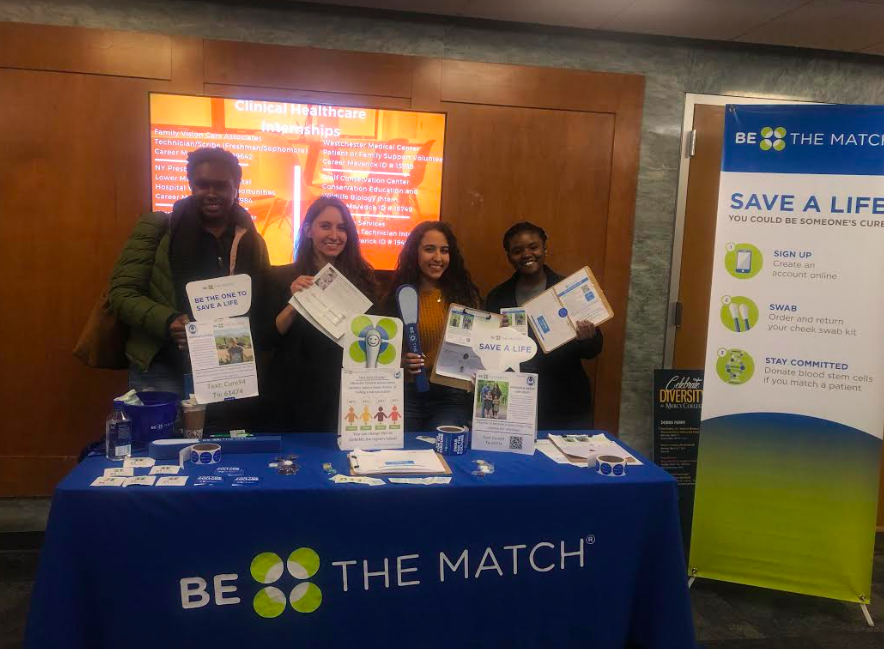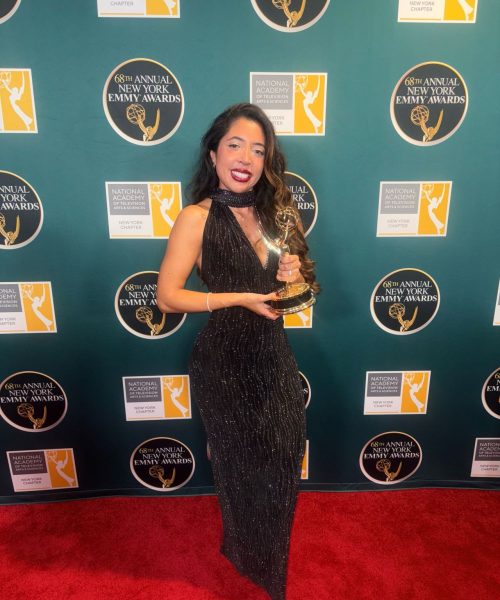Humanitarian Society Promotes Bone Marrow Donation
“Hey, do you wanna save a life?” Lauren Hero told Mercy College students as they passed by the Lecture Hall.
On March 14, the Humanitarian Society teamed up with Be the Match, an organization that focusses on registering people to receive swab kits in order to see if they are matches for patients in need of Bone Marrow Transplant.
Bone marrow transplant, also called a blood stem cell transplant or BMT, can treat many diseases. For some diseases, BMT is the only potential cure. There are over 70 diseases that can be treated by BMT including blood cancers like leukemia or lymphoma, one marrow diseases like aplastic anemia, or other immune or genetic diseases like sickle cell disease.
Hero is a Senior Community Engagement Representative. “I work to add more donors to the registry by educating the public about the need for donors and asking people to join the registry. Joining the registry is easier than ever before. If someone wants to join they simply create an online account in order to receive a free cheek swab in the mail.”
One can visit: join.bethematch.org/Mercy or Text: Cure94 To the number: 61474.
Once one receives their cheek swab in the mail, one will simply follow the instruction in the package and return the swabs in the prepaid and pre address envelope. The cheek swab is used to test your tissue type to see if you are a genetic match for a searching patient.
“Only about 1 out of every 430 people that join and swab become a match. If you are lucky enough to become someone’s match, you have the chance to literally save someone’s life. Be The Match will work with you to pick the best date possible for you to donate at a hospital. All expenses are covered by Be The Match,” Hero explained.
Hero also explained to students the process of BMT if they are in fact a match.
“The first thing you do when you match is get a free blood test and physical to confirm you are the best possible match and you are healthy enough to be a donor. If you are cleared to continue you will be asked to donate peripheral blood stem cells, PBSC, or bone marrow cells. Eighty percent of donors are requested to donate PBSC. The process on donating PBSC is similar to donating blood but we are only extracting PBSC cells and returning all of the other blood back into your other arm.”
Twenty percent of donors are requested to donate bone marrow cells.
Many students wondered if the procedure is painful or had side effects she replied to the concerns “Patients receive anesthesia and feel no pain while a doctor uses needles to withdraw liquid marrow from the back of your pelvic bone. You will usually be discharged from the hospital during the same day of the procedure.”
“Most of the time donors will donate PBSC. The donor will feel fatigued and perhaps experience slight headaches. Donors will be under anesthesia when donating bone marrow cells, so there is no pain when donating. The soreness and fatigue after the donation varies from person to person. Some say they simply feel discomfort like sleeping wrong, others say it feels like a bruise, and some say its like a muscle ache after working out too hard. You should expect to be back to your normal routine within 1 to 7 days, “she said.
A lot of people have a misconception of BMT and turn down donating simply because they don’t know enough information on it. Hero says that if a people took the time and put it into perspective, more people would register to find out if they match.
“Imagine if your friend or family needed a donor but you didn’t match them? You would be relying on donors from the Be The Match registry to step up to the plate and donate. You would want it for your friends or family, so why not make it a reality for someone else’s family? It’s easy to become someone’s hero.”
Sophomore Alyssa Pagano, President of the Humanitarian Society, chose to collaborate with the Be the Match organization and sent students from the club to recruit people to register.
“I chose this organization because many people realize the slim chance of someone finding a match, and Lauren was a tremendous help explaining to the students about the cause as well as the members of the Humanitarian Society. As a club that likes to help people in need, we try to bring awareness to as many organizations as we can big or small, ” she said.
Pagano felt the event went well and was pleased with its results. “Many people think the process is intimidating, but with Lauren’s help they were able to understand the process and benefits which increased the amount of people who sign up and create a profie for the organization.”
Toni, a sophomore, is a member of the Humanitarian Society. She volunteered at the event and also signed up to potentially become a match herself.
“I was a bit scared about the idea of donating bone marrow, but Lauren broke it down into simpler terms and enlightened me with stories about people that I can potentially save… knowing that I can save a life. I’m willing to donate at this moment if I’m lucky enough too.”
One story that resonated with her was a young Latina girl who can not find a match for bone marrow. “It was so sad to hear because I won’t be able to match her even if I tried due to my different background but I hope with more people signing up she will find hers eventually.”
A simple three step sign up could lead to saving the life of someone in need, with the help of Be the Match the students of Mercy College were able to participate in being the potential hero to someone in need.








